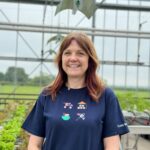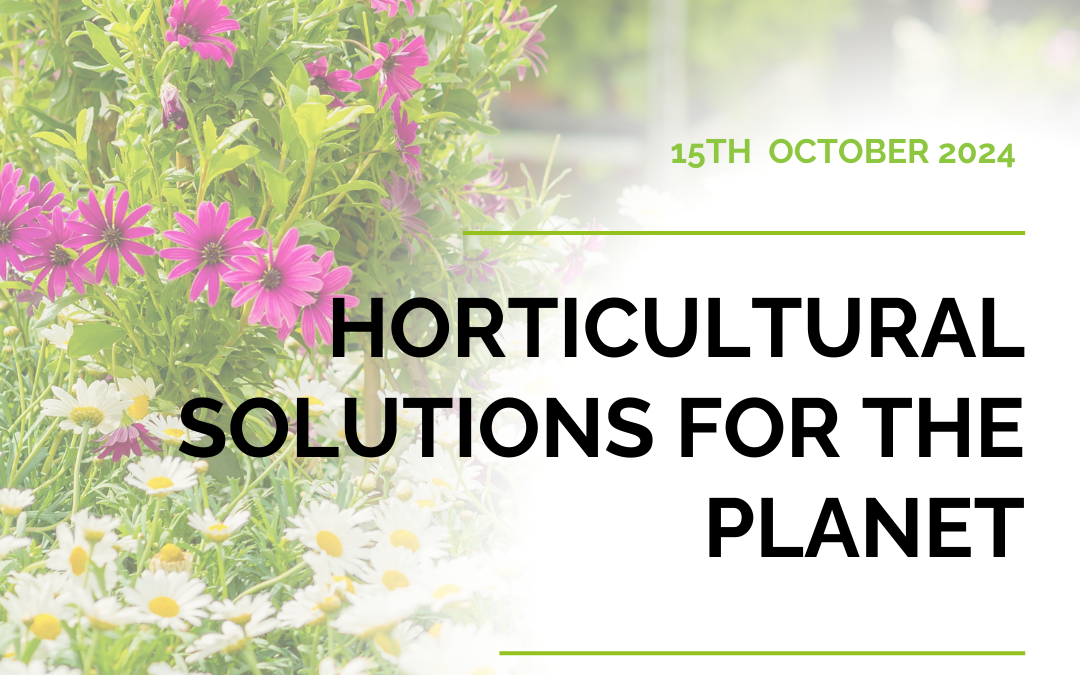Date – 15 October 2024
Time – 12:00 am
40 Years of Uniting a Growing Profession
In 2024 The Chartered Institute of Horticulture will celebrate its 40th anniversary.
To start the celebration, the CIH will host a conference at the Royal Botanic Gardens Kew to spotlight the many and varied contributions of horticulture and its solutions towards a healthy and sustainable planet. We are inviting speakers from a broad spectrum of the industry to highlight their various sectors and future developments.
Save the Date: Tuesday 15th October 2024, RBG Kew, London
This inclusive event will bring together the best and most inspiring practitioners to share solutions, insights and innovations where horticulture is driving positive change.
The conference will feature talks from industry experts and early-career horticulturists. Horticulture, the original ‘Green Career’ has the solutions to many of the greatest challenges facing humanity. Join us, for an inspirational day that we hope will increase the recognition, visibility and the importance of our profession in rising to these challenges.
MEET THE SPEAKERS
Prof. Michael Hardman
 Prof. Mike Hardman is Chair in Urban Sustainability at the University of Salford in England. He is an interdisciplinary researcher interested primarily in cities and has published widely on topics from guerrilla gardening to urban agriculture and green infrastructure. His work is global in nature, with projects in the likes of Africa, North America, Europe and elsewhere, focussing on themes from the potential to upscale radical greening initiatives, to large-scale urban farming. Mike has obtained funding from charities, industrial partners and global bodies for this work, with recent projects funded by the likes of Horizon Europe. He also holds a number of senior editor roles, external advisory roles and regularly speaks in the media on urban sustainability. Such external roles include as a Trustee of Social Farms & Gardens, a national charity for gardening, growing and farming.
Prof. Mike Hardman is Chair in Urban Sustainability at the University of Salford in England. He is an interdisciplinary researcher interested primarily in cities and has published widely on topics from guerrilla gardening to urban agriculture and green infrastructure. His work is global in nature, with projects in the likes of Africa, North America, Europe and elsewhere, focussing on themes from the potential to upscale radical greening initiatives, to large-scale urban farming. Mike has obtained funding from charities, industrial partners and global bodies for this work, with recent projects funded by the likes of Horizon Europe. He also holds a number of senior editor roles, external advisory roles and regularly speaks in the media on urban sustainability. Such external roles include as a Trustee of Social Farms & Gardens, a national charity for gardening, growing and farming.
Prof. Simon Pearson
 Simon has been responsible for founding and developing the Lincoln Institute of Agri Food Technology (LIAT), now recognised as “world leading” within the 2021 BEIS Innovation Strategy, Creating the Future. His group have helped pioneer the development of advanced robotic systems, machine learning, artificial intelligence and digital systems for UK agriculture. These systems are now entering the marketplace and in 2021, 12 Saga Thorvald robot systems co-developed with the Lincoln team, achieved the milestone of 10,000km of on-farm autonomy. In 2021, he co-chaired the DEFRA Automation and Robotics Review with former Secretary of State George Eustice.
Simon has been responsible for founding and developing the Lincoln Institute of Agri Food Technology (LIAT), now recognised as “world leading” within the 2021 BEIS Innovation Strategy, Creating the Future. His group have helped pioneer the development of advanced robotic systems, machine learning, artificial intelligence and digital systems for UK agriculture. These systems are now entering the marketplace and in 2021, 12 Saga Thorvald robot systems co-developed with the Lincoln team, achieved the milestone of 10,000km of on-farm autonomy. In 2021, he co-chaired the DEFRA Automation and Robotics Review with former Secretary of State George Eustice.
Over the last 7 years, Simon’s group have leveraged over £73M of collaborative research and development funding to underpin an extensive range of agricultural technologies. This includes co-leadership of the EPSRC AgriForwards Centre for Doctoral Training cohort of 50 PhD’s, joint with the Universities of Cambridge and East Anglia – one of the largest global cohorts of agri-robotics PhD’s – bringing in new talent to the industry; key people who will help resolve complex challenges across agriculture. Prior to joining Lincoln, Simon was Director of a farming company producing cut flowers in Lincolnshire and Cornwall. He grew up in South Lincolnshire, where his family produced vegetable and cereal crops.
For his contribution to the sector, he was awarded the 2022 RASE Science and Technology Award.
Dr. Harry Langford
 Harry has a PhD in Environmental Engineering and is a dynamic, interdisciplinary environmental scientist and Agri-Tech innovation expert, working within the Agri-Tech sector to advance crop productivity and food system sustainability. With a background in soil structure and function, he has expertise across soil health and sustainable agriculture, novel environmental sensing, and controlled environment agriculture. His career has spanned several Agri-Food system roles, including as a knowledge exchange and innovation manager within the N8 Agrifood Resilience Programme. His current role within the UK Agri-Tech Centre is to support and develop collaborative R&D, and exchange knowledge, across the agri-food supply chain to deliver sustainability impacts for the sector and wider economy. He leads several collaborative R&D projects in Controlled Environment Horticulture in particular, for the UK Agri-Tech Centre, aiming to improve the scalability and sustainability of CEA within the UK. He also leads on Open Innovation, working with sector stakeholders to develop realistic and robustly assessed solutions to critical sector challenges to drive sector growth and impact.
Harry has a PhD in Environmental Engineering and is a dynamic, interdisciplinary environmental scientist and Agri-Tech innovation expert, working within the Agri-Tech sector to advance crop productivity and food system sustainability. With a background in soil structure and function, he has expertise across soil health and sustainable agriculture, novel environmental sensing, and controlled environment agriculture. His career has spanned several Agri-Food system roles, including as a knowledge exchange and innovation manager within the N8 Agrifood Resilience Programme. His current role within the UK Agri-Tech Centre is to support and develop collaborative R&D, and exchange knowledge, across the agri-food supply chain to deliver sustainability impacts for the sector and wider economy. He leads several collaborative R&D projects in Controlled Environment Horticulture in particular, for the UK Agri-Tech Centre, aiming to improve the scalability and sustainability of CEA within the UK. He also leads on Open Innovation, working with sector stakeholders to develop realistic and robustly assessed solutions to critical sector challenges to drive sector growth and impact.
Ali Capper
Ali is in Partnership at Stocks Farm, Suckley, Worcestershire UK with her husband Richard and his father Mark, the Cappers’ specialise in growing hops and apples. They farm dessert & cider apples and hops.
Ali’s former 18-year career was in Advertising & Marketing.
Ali is a former Board member (2012-2024) of and Chairman (2016-2022) of the NFU’s national Horticulture & Potatoes Board and was a Trustee of Nuffield Farming Scholarship Trust (2014-2019). Ali was also a long standing Board member of British Hop Association and Wye Hops until 2024.
Today, in addition to numerous roles at the farm, her work includes membership of the Board of the Oxford Farming Conference. Ali is Executive Chairman of British Apples & Pears Ltd since 2018, Chairman of Horticulture Crop Protection Ltd, a Nuffield Scholar (2013) and a non-executive Director of NFU Mutual.
Prof. Alistair Griffiths
 Alistair leads the RHS’s highly skilled team of scientists focused on assimilating, evaluating and sharing the most current scientific knowledge and undertaking scientific research to provide high-quality, evidence-based solutions to address horticultural challenges. Alistair is responsible for ensuring that the RHS charity remains at the forefront of horticulture science. Prior to the RHS he was a key player in using horticulture science to create the award-winning Eden Project, spending a decade there as Head Scientist.
Alistair leads the RHS’s highly skilled team of scientists focused on assimilating, evaluating and sharing the most current scientific knowledge and undertaking scientific research to provide high-quality, evidence-based solutions to address horticultural challenges. Alistair is responsible for ensuring that the RHS charity remains at the forefront of horticulture science. Prior to the RHS he was a key player in using horticulture science to create the award-winning Eden Project, spending a decade there as Head Scientist.
Alistair is interested in how gardens, gardening and growing garden plants (indoors or out) can help towards improve the wellbeing of people, and is co-author of Your Wellbeing Garden: How to Make Your Garden Good for You – Science, Design, and Practice. His ambition is to build a more resilient gardening community who enjoy their gardens and who take positive action to benefit their gardening handprint on the planet and to maximise the health of our nation.
Helen Baxter
 Food security and climate change are significant challenges for the future and ongoing research into precision horticulture and agriculture is critical. Helen is a PhD student and post-graduate researcher studying the effects of seaweed biostimulants on plant and crop growth. With degraded soils, increased drought and heat stress and the need to reduce and refine fertiliser inputs, developing sustainable solutions are critical areas for research. She is investigating changes in physiological plant mechanisms, tolerance to stress and changes in crop quality and nutrients following the use of seaweed biostimulants.
Food security and climate change are significant challenges for the future and ongoing research into precision horticulture and agriculture is critical. Helen is a PhD student and post-graduate researcher studying the effects of seaweed biostimulants on plant and crop growth. With degraded soils, increased drought and heat stress and the need to reduce and refine fertiliser inputs, developing sustainable solutions are critical areas for research. She is investigating changes in physiological plant mechanisms, tolerance to stress and changes in crop quality and nutrients following the use of seaweed biostimulants.
Helen originally qualified as a medical doctor and worked for many years as a Consultant Psychiatrist before deciding on a career change. She returned to university to study a BSc in Horticulture and during this degree rekindled her interest in biology and plant science. During the degree she was awarded the Boots Company Cup for being Top Student in her first two years. She completed the BSc(Hons) Horticulture with a First and was awarded the Wickstead Trophy as Top Student in BSc. During this Helen completed a dissertation looking at the use of seaweed biostimulants to protect against abiotic stress, such as drought, and received the Nottingham Trent University Dissertation Prize for the Top Dissertation in the School of Environmental Sciences.
Charles Shi

Charles is a Botanical Horticulturist at the Royal Botanic Gardens, Kew, where he curates and manages the Wild Rose Collection.
His curiosities revolve around the analysis of plant collections through biochemistry, in research projects involving volatiles and scent.
Following working the Rhododendron Dell at Kew, and interest of woodland gardens, he partook in a plant collecting expedition to the montane forests of Northwest Vietnam.
Dr. Rhaghavendra Prasad
 As a post-doctoral fellow at the Royal Horticultural Society (RHS), Raghavendra leads the collaborative “Transition to Peat-Free” research project involving the RHS, industry partners, and DEFRA. In this role, he works closely with eight commercial nurseries collectively producing 143 million plants annually. Additionally, he collaborates with growing media manufacturers. Research focusses on peat-free growing media solutions that are economically and environmentally sustainable, whilst also being practically viable in professional settings.
As a post-doctoral fellow at the Royal Horticultural Society (RHS), Raghavendra leads the collaborative “Transition to Peat-Free” research project involving the RHS, industry partners, and DEFRA. In this role, he works closely with eight commercial nurseries collectively producing 143 million plants annually. Additionally, he collaborates with growing media manufacturers. Research focusses on peat-free growing media solutions that are economically and environmentally sustainable, whilst also being practically viable in professional settings.
Raghavendra’s horticultural journey began with an early curiosity about plants, which evolved into a deep passion for sustainable cultivation practices. Holding a Bachelor of Science (BSc) degree in Horticulture, he furthered his education by attending a course on “Sustainable Agricultural Solutions” in Israel. This experience fueled his interest in soilless growing methods, precision water management, and efficient fertiliser use.
Driven by curiosity, he pursued a Master of Science (MSc) in Horticulture, focusing specifically on soilless growing media. During his doctoral research, Raghavendra explored alternatives to peat by experimenting with materials from horticultural waste streams. Formulating peat-reduced and peat-free mixes using Spent Mushroom Substrates, he meticulously characterised their properties. Establishing plants in these innovative media compositions allowed him to study their relationship with the growing environment.
Simon Toomer
 Simon Toomer has spent his working life as a forester, arboriculturist and botanist. He is Curator of Living Collections at Kew Gardens and was formerly Director of The National Arboretum, Westonbirt, and Senior National Consultant for Plant Conservation with the National Trust.
Simon Toomer has spent his working life as a forester, arboriculturist and botanist. He is Curator of Living Collections at Kew Gardens and was formerly Director of The National Arboretum, Westonbirt, and Senior National Consultant for Plant Conservation with the National Trust.
More speakers still to be announced – keep checking back for further updates!
